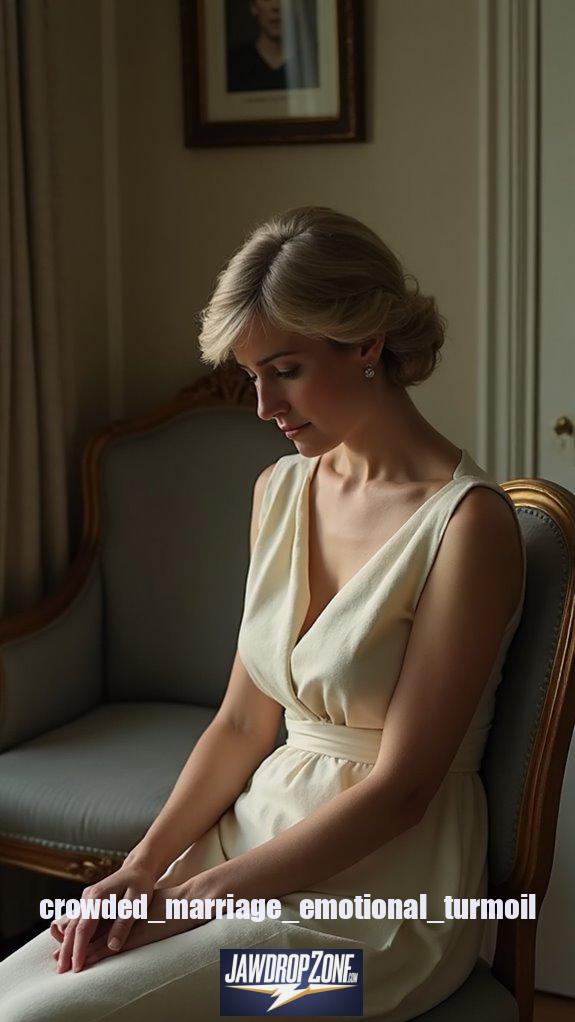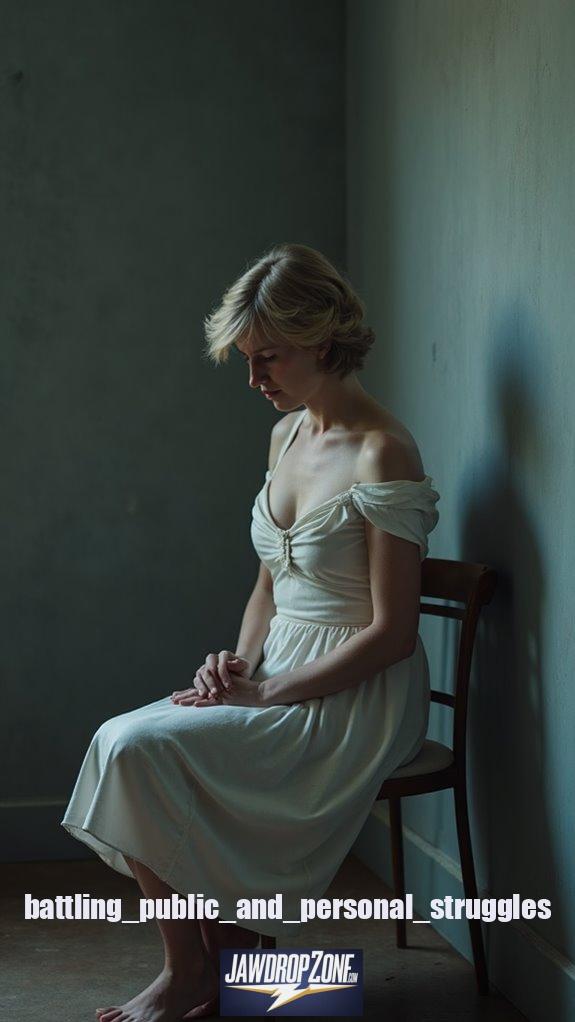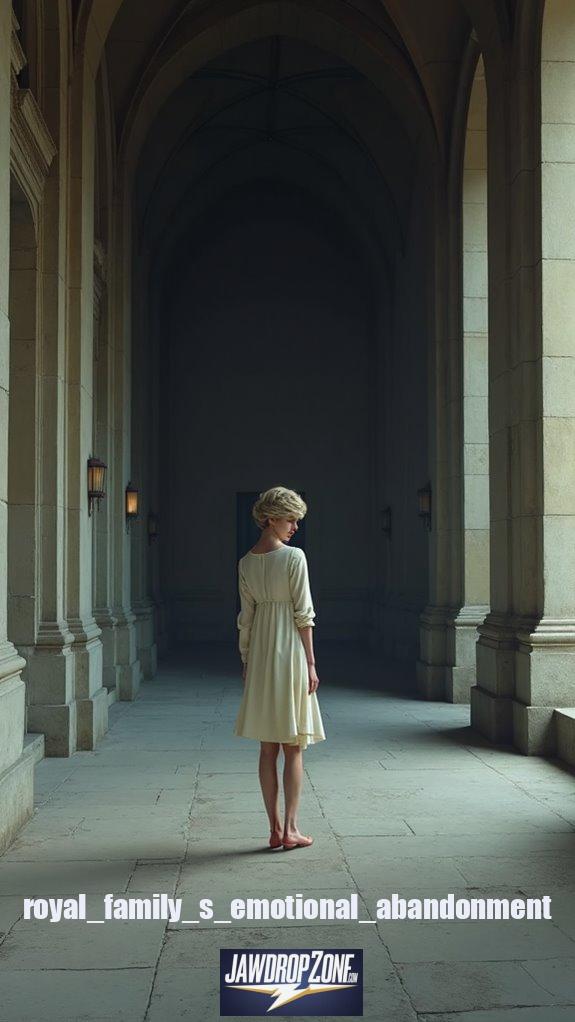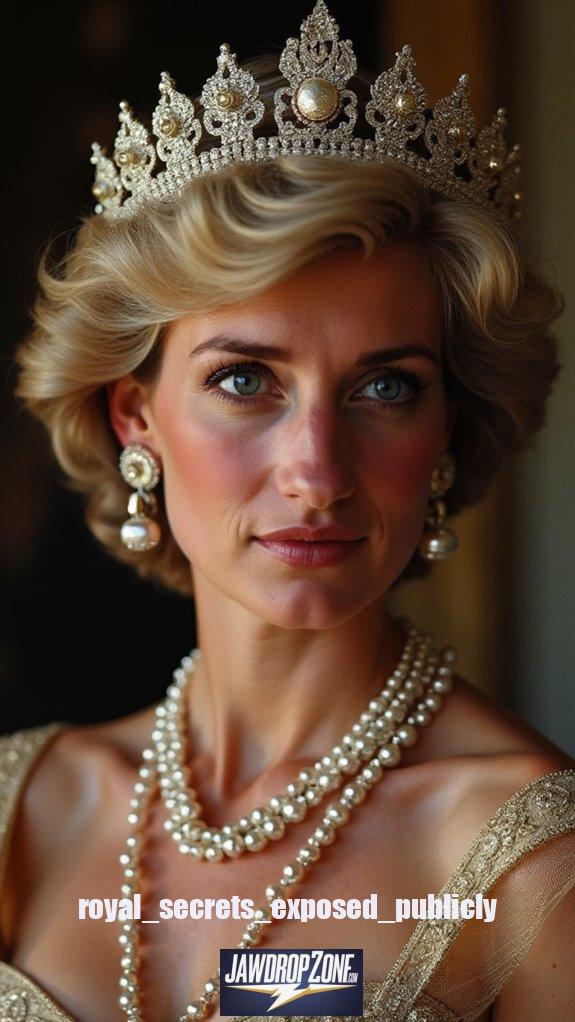Princess Diana’s 1995 BBC Panorama interview revealed shocking truths about her royal life. She described her marriage to Charles as “crowded,” pointing to his affair with Camilla. Diana shared her struggles with bulimia and self-harm, feeling isolated at Kensington Palace. She doubted Charles’s ability to be King, citing his temperament. Ultimately, she dreamed of being the “Queen of Hearts” through humanitarian work. Stick around to uncover deeper understandings into her heartfelt story.
The Crowded Marriage: Diana on Charles and Camilla

Let’s plunge into the challenging story of Princess Diana’s marriage to Prince Charles. Their union faced intense struggles, largely due to the affair dynamics with Camilla Parker Bowles.
Diana, in her 1995 BBC Panorama interview, confirmed Charles’s relationship with Camilla, famously saying, “There were three of us in this marriage, so it was a bit crowded.” This revelation shocked many, exposing a painful truth she’d sensed through intuition and others’ concerns.
The emotional turmoil Diana endured was clear as she described maintaining a public image while hiding deep distress. Charles’s refusal to end things with Camilla, even admitting his feelings publicly in 1994, left Diana feeling hopeless.
She believed the royal family ignored the affair, adding to her isolation. The leaked intimate tapes of Charles and Camilla further humiliated her, confirming the betrayal. This interview, watched by over 20 million people, amplified the public’s sympathy for Diana’s plight watched by millions.
This crowded marriage, strained by secrets, ultimately led to their inevitable divorce.
Personal Struggles: Battling Bulimia and Self-Harm

Turmoil marked Princess Diana’s personal life as she battled bulimia and self-harm.
Her bulimia struggles began at 19, right after her engagement, triggered by a hurtful comment about her weight. The stress of public attention and personal challenges added to her pain. She described bulimia as a secret disease, a cycle of eating for comfort, then purging due to shame. This struggle mirrors the story of Queen’s unbelievable survival, highlighting how public figures often face deep personal battles hidden from the world.
Diana saw it as a cry for help, an escape from deep emotional hurt. This disorder persisted for nearly a decade, reflecting the depth of her struggles persisted for decade.
She also revealed self-harm coping methods, admitting to hurting her arms and legs. This was her way to express inner pain when words failed.
In her 1995 BBC interview, she shared feeling ashamed but hoped to break the silence. Her honesty sparked the “Diana Effect,” inspiring others to seek support.
Royal Isolation: Feeling Unwanted by the Palace

Princess Diana faced not only personal battles but also deep loneliness within the royal family. She often felt emotional abandonment, struggling with royal loneliness at Kensington Palace, which seemed isolating. In many ways, her sense of isolation mirrored that of historical figures like Queen Nzinga, who fought against overwhelming challenges.
Diana shared how the family didn’t know how to support her post-partum depression after William’s birth. They labeled her “unstable,” making her hide her true feelings, as she felt compelled to perform.
Moreover, Diana believed the royal establishment saw her as a “non-starter” for Queen, especially for leading with heart. After separating from Charles, she felt like a “problem,” facing a formidable foe in the family.
Diana felt dismissed by the royal establishment as unfit for Queen, branded a “problem” after her separation from Charles, facing fierce opposition.
The deceitful BBC interview, with forged documents, deepened her fear and isolation, as Prince William noted. Even seeking help from the Queen about her marriage brought no real support, leaving her feeling unheard. Her struggles with bulimia further compounded this sense of isolation, as she battled privately with self-harm behaviors.
This royal loneliness, paired with emotional abandonment, painted a picture of a woman struggling alone amidst palace walls.
Questioning the Crown: Doubts About Charles as King

While Princess Diana faced deep loneliness within the royal family, she also harbored serious doubts about Charles’s ability to be King. In the 1995 BBC Panorama interview, watched by millions, she openly questioned if he could handle the role. She told friends and journalists, like Max Hastings, that Charles struggled with the demands of the “top job.” Diana felt the position of King would be suffocating, limiting his freedom.
Moreover, Diana worried about Charles’s temperament, believing his mood swings could harm his leadership. She also doubted his emotional resilience, noting he lacked the empathy to connect with people. His introverted nature, she said, made him retreat under pressure. Additionally, she expressed concern that his personal struggles, including past relationships, might overshadow his ability to lead with clarity and focus past relationships. Diana’s candid remarks echoed sentiments from historical rebellions, where royal figures challenged their institutions to instigate change and reform.
These concerns, shared publicly, unsettled many who valued the monarchy’s stability. Diana’s words, though honest, created tension, as they challenged the future of the crown. Her focus remained on protecting the institution’s integrity for future generations.
A New Vision: Aspiring to Be the Queen of Hearts

Diana didn’t stop advocating after her separation from Prince Charles in 1992. She shared a bold vision during her 1995 BBC Panorama interview, watched by nearly 23 million people. When asked about becoming Queen of England, she firmly said no, instead aspiring to be the “Queen of Hearts” in people’s lives. She wanted to connect with ordinary folks, offering safety and hope through her actions.
Her compassionate leadership shone as she focused on humanitarian causes, like supporting those with AIDS and leprosy. Diana took her sons, William and Harry, to see these projects, teaching them kindness. Her iconic interview revealed personal struggles, deepening public empathy for her cause. iconic interview Throughout history, many royal women have transformed their challenging circumstances into opportunities for leadership, echoing Diana’s resilience.
She used her role for public service, drawing attention to vulnerable people needing help. Though the royal establishment saw her as different, her heart-led approach inspired many. Her strength in showing love, despite challenges, made her a comforting figure for millions seeking understanding.
Diana’s Secret Recordings
Although many knew Princess Diana through public appearances, few realized she made secret recordings. In 1991, she worked with biographer Andrew Morton, answering his questions on tapes. These were smuggled out of Kensington Palace by her friend, Dr. James Colthurst, often by bicycle.
Diana’s motivations stemmed from a need to share her true story, revealing her unhappiness and struggles. She spoke about betrayal, bulimia, and her marriage’s breakdown in about seven hours of recordings.
Her secret ambitions included being heard and understood by the public, beyond her royal role. These tapes, recorded privately with safety measures like phone scramblers, formed the basis of Morton’s 1992 book, “Diana: Her True Story.”
Later, during her 1995 BBC Panorama interview, Diana confirmed her involvement with Morton. Despite controversies around the BBC interview’s methods, her recordings remain a protected glimpse into her personal challenges and heartfelt desires.
Questions and Answers
How Were the BBC Interview Tapes Obtained?
The BBC interview tapes were obtained through dishonest methods by journalist Martin Bashir.
He forged bank statements to trick Earl Spencer, Diana’s brother, into arranging the meeting. This raised serious concerns about tape authenticity and interview ethics, as trust was broken.
Bashir exploited fears of spying, deceiving those involved. An investigation later confirmed these unethical actions, upsetting many who value honesty.
The BBC apologized for failing to uphold fair standards.
What Deceitful Methods Did Martin Bashir Use?
Martin Bashir used deceptive tactics to gain trust and access for a major interview. He created fake bank statements, falsely showing payments to staff for spying, to mislead others.
Bashir also fueled fears of surveillance, making up stories to deepen distrust. These actions violated media ethics, harming trust and safety.
Why Did Bashir Leave the BBC?
In a staggering turn of events, Bashir’s departure from the BBC shocked many in 2021.
He left his role as Religion Editor, citing serious health issues, including COVID-19 complications and heart surgeries.
Officially, he stepped down in May after informing the BBC in April.
His exit raised questions about BBC accountability, especially with an investigation looming.
For safety and clarity, it’s clear health was a key, undeniable factor.
How Did Prince William React to the Controversy?
Prince William reacted strongly to the controversy surrounding the BBC interview with his mother.
He issued a statement expressing deep sadness over the media ethics failures, blaming the BBC for deceiving Diana.
This, he said, worsened her fear and isolation, hurting the Royal Family.
He criticized the use of fake documents to secure the interview, called it illegitimate, and demanded it never air again, seeking truth and fairness.
Will the BBC Ever Air the Interview Again?
The BBC has firmly decided they won’t air the 1995 Princess Diana interview again.
In July 2022, Director-General Tim Davie announced this ban on future broadcasting, respecting Prince William’s wishes.
They’ll only use short clips for specific journalistic needs, with strict approval.
This protects viewers from misleading content, as public response has shown concern over past deceit.
The decision, following the Dyson Inquiry, prioritizes trust and safety for everyone involved.
References
- https://www.hearstnetworks.com/
- https://www.harpersbazaar.com/culture/film-tv/a41913280/the-crown-season-5-princess-diana-panorama-interview/
- https://www.newsweek.com/princess-diana-panorama-interview-bbc-martin-bashir-crown-season-five-1758971
- https://en.wikipedia.org/wiki/An_Interview_with_HRH_The_Princess_of_Wales
- https://www.factualamerica.com/byline-blunders/martin-bashir-the-diana-interview-that-haunted-the-bbc
- https://www.youtube.com/watch?v=VpTc01QQMxU
- https://www.cosmopolitan.com/uk/reports/a41801074/the-crown-diana-tapes/
- https://www.independent.co.uk/life-style/royal-family/princess-diana-affair-panorama-bashir-charles-b1850616.html
- https://theweek.com/media/princess-diana-interview-martin-bashir-dossier
- https://news.sky.com/story/martin-bashir-said-jealousy-led-to-claims-about-his-diana-interview-as-bbc-releases-his-emails-13060192
- https://www.dailymail.co.uk/news/royals/article-14506507/martin-bashir-bbc-princess-diana-interview.html
- https://time.com/6231367/the-crown-martin-bashir-panorama-interview/
- https://people.com/royals/princess-diana-bbc-panorama-interview-biggest-bombshells/
- https://www.youtube.com/watch?v=sq3QuWIvggs&pp=0gcJCdgAo7VqN5tD
- https://www.youtube.com/watch?v=cYDgiuKmbFk
- https://www.youtube.com/watch?app=desktop&v=xCBa4vvm8uQ
- https://timesofindia.indiatimes.com/life-style/health-fitness/health-news/the-peoples-princess-diana-suffered-from-this-secret-illness-for-nearly-a-decade-know-what-it-is/photostory/93589600.cms
- https://www.psychologs.com/bulimia-princess-dianas-hidden-health-struggle/
- https://www.indiatoday.in/lifestyle/people/story/princess-diana-prince-charles-marriage-disaster-depression-bulimia-secret-tapes-lifest-982452-2017-06-13
- https://www.independent.co.uk/life-style/royal-family/princess-diana-bulimia-the-crown-netflix-b1722477.html

Leave a Reply